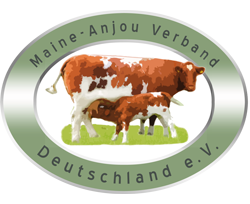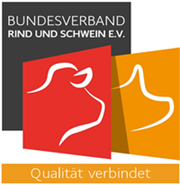Bylaw of the Maine-Anjou Association Germany (registered society)
Name, Purpose and Tasks
§ 1 Name, place of business, area of responsibility
- The Association holds the name:
Maine-Anjou Verband Deutschland e.V. (Maine-Anjou Association Germany registered society)
- The Association is a registered society in the register of associations located in Busdorf. It is a member of the “Bundesverband Deutscher Fleischrinderzüchter” (Federal Association of German Beef Cattle Breeders).
- The business year of the Association corresponds with the calendar year. The first business year is an incomplete business year. It begins with the registration of the association in the register and ends on 31 December of the same year.
§ 2 Purpose and Tasks of the Association
The purpose and tasks of the association are:
- The association is responsible for providing support as well as breeding related advice to all German Maine-Anjou breeders and owners.
- The association promotes and supports the advancement and spread of Maine-Anjou breeding in Germany.
- The association is responsible for conducting and implementing functions for breeders (shows and exchange of experiences) of the Maine-Anjou breed in Germany.
- The association is the special interest group of Maine-Anjou breeders and owners. To fulfill its goals, the association cooperates closely with the respective state associations, as well as the Federal Association of German Beef Farmers.
Click here for the complete bylaw
§ 3 Non-profit Status of the Association
- The association pursues exclusively non-profit purposes according to the section “tax-advantaged purposes” of the General Fiscal Law.
- The association does not pursue profit. A possible surplus is used to support the statutory purposes. Insofar as possible, expenditures for the association will be compensated.
- As a non-profit organization, the association does not primarily pursue individual economic purposes. The resources of the association are only to be used for statutory purposes.
- No individual is to benefit from disproportionate compensations or expenditures that defy the purposes of the association.
§ 4 Membership
- Any natural person or corporate entity prepared to support the purposes and tasks of the association can become a member.
- Minors need the consent of a legal guardian.
- Members are required to pay their contributions regularly via direct debit. The amount of the contributions is determined at the members’ assembly.
- Membership applications must be submitted to the board in writing. The applicant will receive a written notification in answer to their applicants.
- Natural persons which have rendered outstanding services in regard to the promotion of Maine-Anjou cattle, can be named honorary members. The appointment of honorary members is the responsibility of the members’ assembly.
§ 5 Expiration of Membership
The membership expires:
- Through voluntary resignation. The resignation must be submitted to the board via registered mail by 30 September of the business year. The membership expires with the business year.
- Through expulsion. The board decides on the expulsion of members.
- Through the death of the member.
Resigning or expulsed members must pay full membership for the running business year.
§ 6 Reasons for Expulsion
The expulsion of a member occurs:
- if membership fees or other requirements were not met by the end of the business year in which they were due.
- in case of a deliberate or grossly negligent violation of the bylaw and the decrees of the entities.
- in case of deliberate injury of the interests or the reputation of the association.
To repeal the decision of expulsion, an appeal to the members’ assembly is permissible. The assembly will then make a final decision by majority vote. An appeal against the measurements of the board must be submitted to the 1st chairperson via registered mail (post delivery date) within 30 days after the measurement has become known.
§ 7 Member Rights
Within the framework of the bylaws and the statutorily issued decrees, members have the right to support and funding by the association, as well as access to all facilities and events of the association.
Every member personally present at members’ assemblies has one vote. Corporate entities receive one vote, which is exercised through an appointed representative.
Votes are not transferable.
§ 8 Member Obligations
Members are obligated
- to adhere to the bylaw and other statutorily issued decrees.
- to disclose information necessary for the implementation of the bylaw to the association’s office.
- to pay the stipulated membership fees on time.
- to refrain from anything that could harm the reputation and interests of the association.
The board has the right to take action against any infractions. Before a punishment is implemented, the accused will receive the opportunity to vindicate themselves.
Punishment is considered:
- Warning
- Reprimand
- Expulsion
To repeal the decision of the board, it is admissible to call on the members‘ assembly, which will make the final decision.
§ 9 Entities of the Association
The entities of the association are:
- the members‘ assembly
- the board
Members of the board can only be voted from the rows of existing members.
§ 10 The Members‘ Assembly
- The Members of the association meet for a general members’ assembly at least once a year. The meeting is called by the 1st chairperson or their representative. Members will be invited in writing with an announcement of the agenda and venue 14 days prior to the date of the assembly (date of postage stamp).
- For pressing reasons, the board can furthermore call an extraordinary members’ assembly with a 14-day stated period. It is obligated to do so if at least a quarter of all members have requested so in writing (stating the relevant reasons) from the 1st or 2nd chairperson. A correctly requested extraordinary members’ assembly must be called within 14 days of the submission of the request. Apart from that, all rules regarding the calling and execution of an ordinary members’ assembly apply.
- The decisions of the members‘ assembly must be recorded and signed by the minute taker and the 1st chairperson, if not decreed differently. The members’ assembly is responsible for:
- the election of the board
- the election of treasurers and minute takers, whereby re-election is possible.
- the acceptance of the annual report and the annual financial statement.
- relieving the board
- changing of the bylaw, for which a majority of three quarters of the submitted votes are necessary
- determination of the place of business
- determination of membership fees
- appointment of honorary members
- decisions about the disbanding of the association; in this case, every member is liable for the maximum amount of one annual membership payment
- approval of the minutes of the previous business year
- Decisions about appeals against expulsion.
Decisions, elections, exonerations, appointments and assignments are implemented by simple majority vote, unless other majorities are statutorily necessary.
- The members‘ assembly constitutes a quorum no matter the number of voters present. Polls and votes are conducted openly or with ballot cards. They must be conducted with ballot cards if a present voting member requests it.
- During the assessment of election results, invalid votes as well as abstentions from the vote are disregarded. A simple majority suffices, except in cases of bylaw changes and disbandment of the association. Such decisions require a three quarter majority of all submitted votes. Vote equality during elections will require one or possibly further ballots.
- Petitions for the members‘ assembly must be submitted in writing to the 1st chairperson of the association at least two weeks prior to the assembly date. The board decides whether a petition will be discussed during an assembly. The board must then take measurements to amend the agenda, if the petitions are signed by at least 10 % of all members. A petition to change the bylaw can only be discussed if it is listed as a separate point on the agenda and was previously deliberated by the board.
- The treasurers are elected out of the members‘ assembly. The election can ensue by hand signal and by the way of a simple majority vote.
§ 11 The Board
Members of the board are:
- the 1st chairperson
- the 2nd chairperson and
- the treasurer.
The board is elected by the members‘ assembly for a period of 4 years. A re-election is possible.
The board remains in office even after their term is completed until a new board has been elected.
Should one member of the board be unable to perform their duties during their term of office, another member will temporarily assume their responsibilities until the next members’ assembly.
The board is responsible for all decisions that are not the responsibility of the members’ assembly. Should the votes result in a tie, the decision lies with the 1st chairperson.
The board decides unanimously about the acceptance of new members.
The board decides unanimously about the expulsion of members.
According to § 26 of the German Civil Code, the board consists of the 1st and 2nd chairperson. They are both individually eligible to represent the association judicially and extra-judicially.Any expenditures of the board caused by their service to the association will be compensated out of the association’s funds.
All decisions made by the board are to be recorded.
§ 12 Disbandment
The disbandment of the association can only be implemented by decree of the members’ assembly. It must be decided with a majority of three quarters of the submitted votes. This decision cannot be circumvented through a previous change of the bylaw.
The motion for disbandment must be explicitly stated on the agenda.
In case of the disbandment of the association or the discontinuation of tax-privileged purposes, all assets fall to the town of Busdorf, which is allowed to use them only for non-profit purposes.
§ 13 Taking Effect
The above mentioned bylaw was decided on 13 October 2012 and takes effect with its signing.
During the first members‘ assembly on 01 December 2012, § 2 was changed into the current version.

